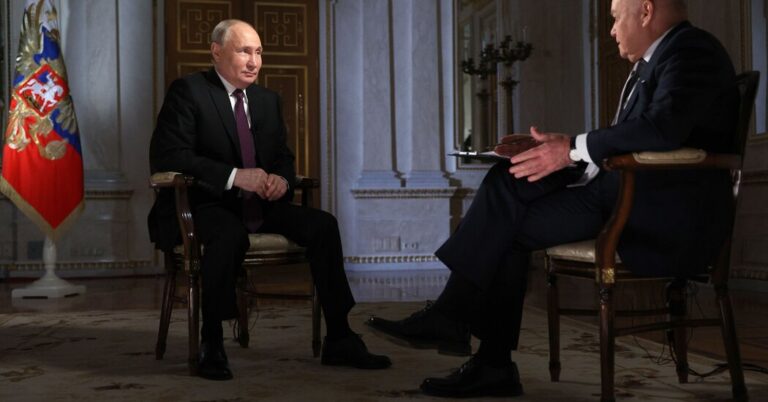President Vladimir V. Putin of Russia tried to play down fears of nuclear war in an interview released on Wednesday and denied having considered using weapons of mass destruction in Ukraine, aiming to bolster his domestic image as a guarantor of stability before the Russian presidential election this weekend.
In a lengthy interview released by Russian state television, Mr. Putin struck a softer tone than in his state-of-the-nation address last month, when he said that the West risked nuclear conflict with Russia if it intervened more directly in Ukraine. In the interview, Mr. Putin described the United States as seeking to avoid such a conflict, even as he warned that Russia was prepared to use nuclear weapons if its “sovereignty and independence” were threatened.
“I don’t think that everything is rushing head-on here,” Mr. Putin said when asked whether Washington and Moscow were headed for a showdown. He added that even though the United States was modernizing its nuclear force, “this doesn’t mean, in my view, that they are ready to start this nuclear war tomorrow.”
“If they want it — what can we do? We’re ready,” Mr. Putin said.
The comments appeared aimed in large part at the Russian electorate, coming two days before polls open in the presidential election, which runs from Friday to Sunday. While Mr. Putin is all but assured to win a fifth term, the Kremlin is keen to drive up turnout to present the vote as a stamp of approval for the president and his full-scale invasion of Ukraine.
Since Russia’s February 2022 invasion of Ukraine, critics of Mr. Putin have increasingly taken aim at what he has long presented as perhaps his biggest domestic selling point: the notion that he brought security and stability after Russia’s chaotic 1990s. Russians appear particularly nervous about the prospect of nuclear conflict; 55 percent of respondents told an independent pollster in January that they feared a new world war.
But in his dealings with the West, Mr. Putin sees the threat of Russia’s enormous nuclear arsenal as one of his most effective instruments. He has repeatedly made reference to that arsenal when trying to deter Western nations from more actively supporting Ukraine, most recently in his Feb. 29 annual address, when he portrayed the deployment of forces from NATO countries to Ukraine as a step that would lead to nuclear war and the “destruction of civilization.”
In the interview released on Wednesday, Mr. Putin tried to address the Russian public’s fears while keeping pressure on the West. Asked whether Russia and the United States were playing a game of chicken, Mr. Putin described President Biden as seeking to avoid a direct war and said that Ukraine’s fate was of far greater importance to Russia than to the United States.
“I’ve said that Biden is a representative of the traditional political school,” Mr. Putin said. “For us, this is a question of life and death, whereas for them it’s a question of improving their tactical position.”
American officials have said that Mr. Putin came closest to using nuclear weapons on the battlefield in Ukraine in the fall of 2022, when Russia’s ground forces were on the back foot and American intelligence intercepted frequent conversations in the Russian military about reaching into the nuclear arsenal.
Asked in the interview released on Wednesday whether he had considered using “tactical” nuclear weapons at that point, Mr. Putin said that “there was never such a need.”
“We have our own principles — what do they say?” Mr. Putin said, referring to Russia’s nuclear doctrine. “That we are ready to use weapons, including any weapons, including those you mentioned, if we are talking about the existence of the Russian state, about doing damage to our sovereignty and independence.”
When asked about his invasion of Ukraine, Mr. Putin said that Russia would push on and increase its firepower on the battlefield to reduce its own casualties.
As he did in last month’s speech, Mr. Putin described his end goal in Ukraine as a deal with the United States akin to the “security guarantees” that Russia proposed in 2021, on the eve of the invasion, which would have given Moscow a new sphere of influence in Eastern Europe and which the West rejected as unacceptable. He also indicated that he saw Russia’s negotiating position as improving, given its military’s advances on the battlefield.
“We are ready, nevertheless, for a serious conversation,” Mr. Putin said. “But we need to plainly and clearly understand for ourselves that this is not a pause that the enemy wants to take to rearm, but that this is a serious conversation with security guarantees for the Russian Federation.”

